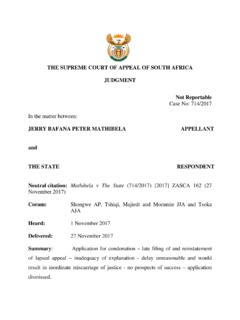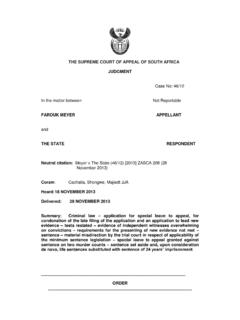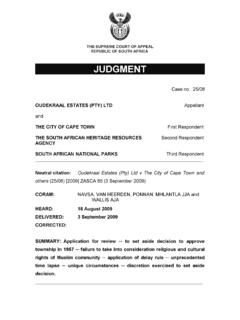Transcription of THE SUPREME COURT OF APPEAL OF SOUTH …
1 THE SUPREME COURT OF APPEAL OF SOUTH africa JUDGMENT Case No: 437/2010 In the matter between: MEDIA 24 LIMITED FIRST APPELLANT KATHU MAMAILA SECOND APPELLANT JACKIE MAPILOKO THIRD APPELLANT v SA TAXI SECURITISATION (PTY) LTD RESPONDENT AND AVUSA MEDIA LTD FIRST AMICUS CURIAE BDFM PUBLISHERS (PTY) LTD SECOND AMICUS CURIAE INDEPENDENT NEWSPAPERS (PTY) LTD THIRD AMICUS CURIAE FREEDOM OF EXPRESSION INSTITUTE FOURTH AMICUS CURIAE Neutral citation: Media 24 v SA Taxi Securitisation (437/2010) [2011] ZASCA 117 (5 July 2011) Coram: Brand, Nugent, Maya, Snyders and Theron JJA Heard: 5 May 2011 Delivered: 5 July 2011 Summary: Defamation action by corporation claim for general damages considered claim for special damages to be brought under the actio legis Aquiliae.
2 2 _____ ORDER _____ On APPEAL from: On APPEAL from SOUTH Gauteng High COURT , Johannesburg (Mathopo J sitting as COURT of first instance): (1) The APPEAL is upheld with costs, including the costs of two counsel. (2) The order of the COURT a quo is set aside and replaced with the following: (a) The defendants special plea with reference to the plaintiff s claim for general damages, referred to in para 16 and prayer 1 of its particulars of claim, is dismissed. (b) Save for para (a) above, the defendants special plea is upheld. (c) The plaintiff s claim for special damages referred to in para 17 and prayer 2 of the particulars of claim, is dismissed. (d) The plaintiff is ordered to pay the costs of these preliminary proceedings, including the costs of two counsel.
3 _____ JUDGMENT _____ BRAND JA (MAYA, SNYDERS AND THERON JJA CONCURRING): [1] This APPEAL has its origin in a defamation action instituted by the respondent against the three appellants in the SOUTH Gauteng High COURT , Johannesburg. The respondent is a finance company that provides financial 3 assistance to purchasers and lessees of taxis. The first appellant publishes a newspaper, City Press, which is distributed countrywide in SOUTH africa . The second appellant is the editor of City Press. The action derived from an article which was published in City Press in June 2008 under the title Taxi owners taken for a ride by finance body . It was written by the third appellant. [2] For reasons that will shortly become apparent, the APPEAL does not turn on the exact content of the article.
4 Suffice it therefore to capture it in broad outline. As can be inferred from the title, the article is highly critical of the way in which the finance body referred to in the article conducts its business. The respondent s case is that the finance body referred to would be understood by the readers of the article as relating to it. This is denied by the appellants in their plea. But because of the procedure adopted by the parties, the allegation must for present purposes be assumed to be true. Among other things the article accused the respondent of cheating on taxi operators ; of conducting its business in a way that is illegal and criminal; of arbitrarily repossessing taxis; and of taking away the means of taxi owners to feed their families. [3] In its particulars of claim the respondent contended that the article was defamatory of it and that it was published with the intention to defame and to injure it in its business reputation.
5 On these grounds it claimed general damages in an amount of R250 000 as well as special damages in the form of lost profits, that it allegedly suffered as a result of the defamation, in an amount exceeding R20 million. [4] The appellants first response was an exception that the particulars of claim were vague and embarrassing, alternatively that it failed to disclose a cause of action. In due course, the exception was dismissed in the high COURT with costs. We are not required to revisit that dismissal and no more needs to be said about the exception. The appellants next step was to file a document which contained both a special plea and a plea on the merits. The special plea 4 challenged the respondent s right to obtain either general or special damages under the law of defamation.
6 For general damages, so the appellants contended, the respondent has no claim at all in defamation, while its claim for special damages is not available under the actio iniuriarum, from which the action for defamation derives, but only under the actio legis Aquiliae. [5] Eventually the matter came before Mathopo J. By agreement between the parties, he was asked to determine only those issues arising from the appellants special plea while all other issues stood over for later determination. During the preliminary proceedings that followed no evidence was led by either parties and the matter was argued on the pleadings. At the end of these proceedings Mathopo J dismissed the special plea with costs. The APPEAL against that judgment to this COURT is with his leave.
7 The four amici curiae only became involved on APPEAL . They all have as their object the protection of the right to freedom of expression, in general, and freedom of the press in particular. At their behest, they were allowed by this COURT to present argument, both written and oral, as part of the APPEAL proceedings. [6] On APPEAL the respondent raised, as it were, a point in limine that the judgment of the COURT a quo is not appealable, because it amounted in the circumstances to the dismissal of an exception. As authority for the proposition that the dismissal of an exception is in principle not appealable, the respondent relied on the decision of this COURT in Maize Board v Tiger Oats Ltd 2002 (5) SA 365 (SCA) which confirmed a long line of earlier decisions to that effect.
8 The way in which the special plea was formulated, is certainly reminiscent of an exception rather than a special plea. In essence it is aimed at alleged defects in the respondent s case that appears from its particulars of claim while a special plea generally requires the introduction of new facts from outside the plaintiff s pleadings. Yet it appears to me that because the matter was in fact not raised by way of exception but by special plea, that part of the case circumscribed for separate adjudication by the COURT a quo had been finally decided, which renders 5 it subject to APPEAL . But be that as it may. At the hearing, counsel for the respondent formally abandoned the point in limine. It therefore requires no further discussion at this stage. In dealing with the merits, I turn first to the issues surrounding special damages.
9 Special Damages [7] The appellants case is not that the respondent has no claim for special damages in the form of the profits it allegedly lost as a result of the defamatory statements. What they contended was that a claim for special damages is not available under an action for defamation, which derives from the actio injuriarum, but only under the lex Aquilia. They were supported in this contention by the amici curiae. The question whether the contention is well-founded, was left open by Corbett CJ in Caxton Ltd v Reeva Forman (Pty) Ltd 1990 (3) SA 547 (A) at 560I-561A when he said: .. [I]t is common cause that such a corporation may also claim damages to compensate it for any actual loss sustained by it by reason of the defamation. It is not necessary in this case to decide whether this latter claim falls under the actio injuriarum or is rather to be classified as Aquilian.
10 [8] Despite the absence of any pertinent decision by this COURT in favour of the appellants, the respondent conceded that its claim for special damages can only succeed if it satisfies the requirements of the actio legis Aquiliae. I believe the concession was rightly made. As was explained by De Villiers JA in Matthews v Young 1922 AD 492 at 503-505, the rule of our law, in principle, is that patrimonial damages must be claimed under the actio legis Aquiliae, while the actio iniuriarum and its derivative actions, including the action for defamation, are only available for sentimental damages. In theory, the person injured by a defamatory publication would therefore have to institute two actions: a defamation action for general damages and the actio legis Aquiliae for special damages.













